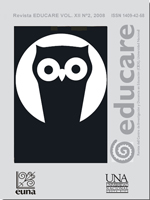Repensar la educación y la pedagogía: algunas reflexiones críticas
DOI:
https://doi.org/10.15359/ree.12-2.3Keywords:
education, pedagogies, inter-culture, curricular flexibility, experiential cultureAbstract
Certainly it becomes necessary to reflect on the school not only as a place of permanent cultural construction, influenced by multiple relationships, but also on how it becomes the place where these connections band together and set up new ones.
In every analysis on education and pedagogies, it must not be left behind the fact that curricular designs explicit and condition the school practices. Likewise, these outlines also determine the intentionality of the teaching practices.
These ideas constitute the basis guiding the reflections of this investigation, which more than appearing as theoretical issues, are actually visualized like practical possibilities. The arguments that are expressed here gather the most significant concerns conveyed by the authors. They account for the approximate outcome of the reading and the reflection on the personal teaching practice gained within the university classrooms and the experience of working with high school students.
References
Aguado, T. ( 2003). Pedagogía Interercultural. Madrid: Editorial McGraw Hill.
Carr, W. (1999). Una teoría para la educación. Madrid: Editorial Morata.
Gallegos, R. (2000). La educación holista. México: Editorial Pax.
Giroux, H. (2001). Cultura, política y práctica educativa. Barcelona: Editorial Graó. (Biblioteca de
aula).
Hargreves, A. (2003). Profesorado, cultura y postmodernidad. Madrid: Editorial Morata.
López F. y Lleras J. (2002). Planteamientos de la pedagogía crítica: comunicar y transformar.
Barcelona: Editorial Graó.
Pérez Gómez, Á. (1999a). Comprender y transformar la enseñanza. Madrid: Editorial Morata.
Pozo Municio, I. (2001). Aprendices y maestros. Madrid: Editorial Alianza.
Rodríguez, A. (1995). Paradigma interdisciplinario en la formación docente. Madrid: Editorial
Narcea.
Tünnermann C. (2005). La Globalización: Desafíos para la educación superior. Programa
Internacional de Gestión de la Calidad y del Cambio en la Educación Superior (UNICAMBIO
XXI). Módulo 5. GTZ‐CSUCA‐DAAD. León, Nicaragua.
Downloads
Published
How to Cite
Issue
Section
License
1. In case the submitted paper is accepted for publication, the author(s) FREELY, COSTLESS, EXCLUSIVELY AND FOR AN INDEFINITE TERM transfer copyrights and patrimonial rights to Universidad Nacional (UNA, Costa Rica). For more details check the Originality Statement and Copyright Transfer Agreement
2. REUTILIZATION RIGHTS: UNA authorizes authors to use, for any purpose (among them selfarchiving or autoarchiving) and to publish in the Internet in any electronic site, the paper´'s final version, both approved and published (post print), as long as it is done with a non commercial purpose, does not generate derivates without previous consentment and recognizes both publisher's name and authorship.
3. The submission and possible publication of the paper in the Educare Electronic Journal is ruled by the Journal’s editorial policies, the institutional rules of Universidad Nacional and the laws of the Republic of Costa Rica. Additionally, any possible difference of opinion or future dispute shall be settled in accordance with the mechanisms of Alternative Dispute Resolution and the Costa Rican Jurisdiction.
4. In all cases, it is understood that the opinions issued are those of the authors and do not necessarily reflect the position and opinion of Educare, CIDE or Universidad Nacional, Costa Rica. It is also understood that, in the exercise of academic freedom, the authors have carried out a rogorous scientific-academic process of research, reflection and argumentation thar lays within the thematic scope of interest of the Journal.
5. The papers published by Educare Electronic Journal use a Creative Commons License:














 The articles published by Educare Electronic Journal can be shared with a Creative Commons License:
The articles published by Educare Electronic Journal can be shared with a Creative Commons License: 



